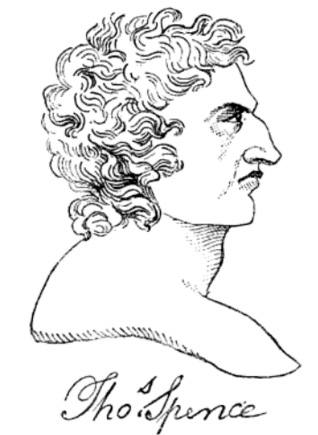| Profile | Major Works | Resources |
Thomas Spence, 1750-1814.

Early English agrarian socialist.
A poor schoolteacher from Newcastle-upon-Tyne, of Scottish descent,
Thomas Spence started his career as an advocate of a new system of
phonetic spelling. But Spence's principal claim to fame
is his lecture on the "Real Rights of Man" read to the Philosophical
Society of Newcastle in 1775, which earned him a brief notoriety.
Echoing Rousseau's essay on inequality,
Spence laid out an image of man in a state of nature with common land,
identified the claim of private property on land as an injustice and the
origins of tyranny. Spence's system called for the abolition of
private property in land, and the adoption of a new communist system of
land ownership. He envisaged the formation local parish corporations,
which would lay claim to ownership of all land in the district, and
allocate it accordingly. Rent would still be charged, but it would
all go to the parish corporation who would invest in improvements and
other public works. In the Spencean utopia, all taxes would be
abolished, save for a land tax on the rent collected by the commune.
Spence's lecture got him ejected from the Philosophical Society -
ostensibly for printing and distributing the lecture without the
Society's consent.
Spence continued to agitate for land nationalization. He was jailed for a time in 1784 in for exhorting a violent land uprising against landlords. He moved to London in 1792, where he eked out a living as a bookcart peddlar putting out occasional pamphlets. He edited a small journal, Pig's Meat, reprinting selections from radical writers like William Godwin and Joseph Priestley. He became a member of the London Corresponding Society, supportive of the French Revolution. Spence was arrested and jailed again for a year for his 1801 tract, deemed seditious by the English authorities.
Spence's followers would form the Society for Spencean Philanthropists. The Spencean movement would be later overshadowed and displaced by other utopian socialists, like Robert Owen..
|
Major Works of Thomas Spence
|
|
HET
|
|
Resources on Thomas Spence
|
All rights reserved, Gonšalo L. Fonseca
